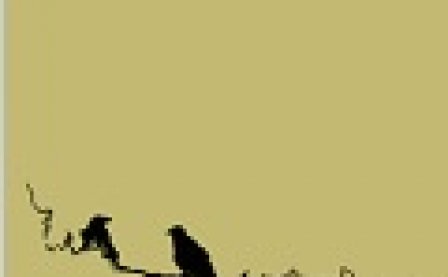
“To excite and exalt our sensibilities, music developed towards the most complex polyphony and the maximum variety, seeking the most complicated successions of dissonant chords and vaguely preparing the creation of musical noise. This evolution towards ‘noise sound’ was not possible before now. To our ears, on the other hand, they sound pleasant, since our hearing has already been educated by modern life, so teeming with variegated noises. But our ears are not satisfied merely with this, and demand an abundance of acoustic emotions.” - Luigi Russolo
Here is our third annual Eureka! list. Like before, the following 25 albums were never previously featured on Tiny Mix Tapes, with writers again having the freedom to highlight whichever albums they wanted. With such intentionally ambiguous criteria as a starting point (what the hell constitutes a “Eureka!” album?), the purpose of the list has absolutely nothing to do with hierarchy and everything to do with new ways of listening. Over the past couple years, it almost seems as if we’re increasingly approaching some sort of definition for “Eureka!,” but here’s hoping a wrench will fuck with any trajectory we might have going and cause us to, yet again, hear new sounds in new ways.
——
——
——
 MV & EE with The Bummer Road
MV & EE with The Bummer RoadMother of Thousands
[Time-Lag]
by P Funk
This sprawling limited edition double-LP is, on paper, much like the other psychedelic fetish items I buy, listen to a couple of times as background music, let sit on my shelf for months on end, and eventually sell on eBay when I want to take my sweetie out to a restaurant that doesn’t serve drinks in paper cups. For some reason — I still can’t figure out quite why — that didn’t happen with this record. The twenty-minute free-form jams felt less like access roads to the players’ record collections and more like lucid dreams, unlikely encounters (Dead C. and John Hurt?!?) framed with an uncanny purposiveness. I always thought that The Stooges and Eno were the sides in a binary opposition: on Iggy’s end we’ve got presence, real-time group interaction, authentic emotion; on Brian’s end rests contrivance, artistic distance, fabrication. The Bummer Road go to show that you can have it both ways, that a twelve-bar motif can send you plummeting into the unknowable void just as easily as a treated tape loop. Americana’s No Pussyfooting? Here it is.
MV & EE - Time-Lag
——
——
——
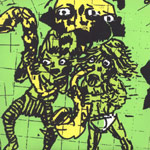 Black Pus
Black PusBlack Pus 1 / Black Pus 2
[DiareahRama]
by Mr P
Rarely does a live experience enhance the illusion created while listening to a record — just because it sounds passionate on record, doesn’t mean it’s easily translated live. Brian Chippendale, however, is an obvious exception. His energy, though therapeutic for him, is utterly crushing for the rest of us. But if Lightning Bolt were a string of detonations, Brian’s solo project Black Pus (a tongue-in-cheek reference to all the “Black ___” bands) was the explosive aftermath. Nevermind the kind that signify fatality and destruction; these explosions were rainbow-colored with ice cream cones and polka-dot jumpsuits, neon signs and whoopee cushions. Brian didn’t need to project a tough-guy attitude to make an immediate impression; his uninhibited pummeling on Black Pus 1 and 2 (and probably 3) more than compensated for any ridiculous fuck-you-I’m-angry-and-wearing-black guise. And with distorted drum chomps, voracious vocals, and sloppy sax squeals that’d make Phil Spector’s ugly alter ego shit a wall of crap, Black Pus proved once and for all that toughness need not be mediated by superficial gestures. And gosh, did you see the silk-screened art? As much as I love the Bolt, I’d take Black Pus over them any day.
Black Pus - Faux Fetus
——
——
——
 Rahsaan Roland Kirk
Rahsaan Roland KirkBrotherman in the Fatherland
[Hyena]
by W.C.
Brotherman in the Fatherland was a poorly titled but brilliant posthumous release by multi-instrumentalist Rahsaan Roland Kirk. Often found simultaneously playing three saxophones, flutes, clarinets, African and homemade instruments, Kirk was always a showman to say the least. Like Eddie Gale or Sun Ra, Kirk found something more ancient and worldly than jazz, both musically and politically. Although his ambitions arguably became greater than his competence, those notions got debunked after hearing Brotherman…, an energetic and far reaching performance from Germany 1972. It’s further proof that the only thing Kirk suffered from was a lack of documentation, and anything that might be perceived as novelty could be backed up with technical merit. Brotherman… found him confidently flying around all his instruments, playing originals, Coltrane standards, and even a soul jazz version of “My Girl.” His band effortlessly drew no boundaries in their post bop, afro-funk, free blowouts, while Kirk’s performances were equal parts melodic brilliance and overblown skronk. Although archivist Joel Dorn seemed hell-bent on sabotaging Kirk’s image with self-mocking liner notes and deliberately uninformative packaging, musically Brotherman… was a quintessential performance of Kirk’s late period, and its importance can’t be understated.
Rahsaan Roland Kirk - Hyena
——
——
——
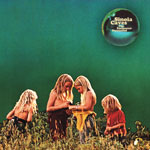 Sinoia Caves
Sinoia CavesThe Enchanter Persuaded
[Jagjaguwar/Brah]
by David Nadelle
Jeremy Schmidt has already cut a wide swath through the West Coast of Canada as resident keyboard guru in various Vancouver bands. His main gig now is with hairy horde Black Mountain, but in 2002 (re-released by Jagjaguwar/Brah in 2006), Schmidt, as Sinoia Caves, made The Enchanter Persuaded, an album that drew upon his love of vintage commercials and soundtrack sounds using his renowned collection of vintage gear. By simple analog synth association (not to mention the Narnia-like song titles), it is easiest to pigeonhole Sinoia Caves comfortably into a prog-psych-Krautrock corner, but The Enchanter works beautifully as a chill-out album — there are neither forays of jumping headfirst into overblown Rick Wakeman-esque histrionics nor extended periods of time-wasting stoner dirge ruining the show. Bolstered by two massive 15+ minute soundscapes, the album showcases Schmidt’s gift for presenting sound as journeys, as flakey as that sounds. The pieces that mostly resemble “songs” flit alongside these two towers with the same atmos of spacerock colliding with folksy acoustics. The time-traveling meddler in me likes to think that if The Byrds’ Roger McGuinn had been armed with a troika of farfisa, Korg CX3, and mellotron instead of his trusty Rickenbacker and strict sense of song structure, he might have produced something like The Enchanter Persuaded.
Jagjaguwar
——
——
——
 Warmer Milks
Warmer MilksRadish on Light
[Troubleman Unlimited]
by Matt Weir
Warmer Milks started as Mike Turner’s solo acoustic project in Lexington, Kentucky, but the dude likes jamming, so WM turned into a full-band jammed. I didn’t hear a better feedback rock record this year, and the best part is this disc doesn’t simply slide easily into that category. Vocals from the throat’s gutter, guitars apparently put through a “twang” pedal, and beautiful, choked dissonance from all instruments involved. This disc stomps, howls, and expresses a unique, passionate vision of rock music as an entity that can move just like nature. Wind, wood, death, and thunder. To read (and see!) more, check out my drool session on “The Shark” in my Drawn Songs thing somewhere in this year-end extravaganza.
Warmer Milks - Troubleman Unlimited
——
——
——
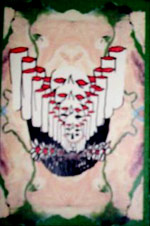 Blues Control
Blues ControlRiverboat Styx - CS
[Fuck It Tapes]
by S. Kobak
If one could hear the lineage between No Neck Blues Band and Excepter, it might sound something like the first few minutes of this tape. “Riverboat Styx” begins with the clicks of a drum machine providing the grounding for beautiful decaying lo-fi dance music. A harmonica’s honk signifies a logical switch to an outta site sludgy drone-blues/piano jam. Welcome to the world of Blues Control, a band comprised of the coolies who jam fantastic dissonant weirdness under the name Watersports. Like Ex-Cocaine, the band creates a sonic narcotic with a deconstructed classic rock template and loads of sludge guitar. This link is apparent on the downer proto-boogie of “Rolling Fog Blues.” However, the band travels beyond the typical wankery of repetitive pentatonic jam and fuzz and strum layers into interstellar, genre-defying regions. Even when the song is repetitive, the band manages to keep the listener’s attention with hypnotic passages. A Tangerine Dream-aping set of sublime keyboard lines and a crashing wave of an organ drone wean the listener off the sound-dope. Riverboat Styx is an early sign of the band’s brilliance and a hint at the opiate tonalities to come in ‘07. Hopefully, some label will release a large-press vinyl reissue of this testament to the power of Blues Control in the near future.
Blues Control - Fuck It Tapes
——
——
——
 Geoff Mullen
Geoff MullenThrtysxtrllnmnfstns
[Entschuldigen]
by Olskooly
It was inordinately satisfying to hear Geoff Mullen turn the “laptop folk” genre completely on its ear with his stunning debut, Thrtysxtrllnmnfstns. If Mullen set out to screw with our heads with idiosyncratic production and outlandish vision, he succeeded. Alternating between soothing, Jeck-esque needle noise and the more structured, percussion-oriented static of Jan Jelinek, Mullen’s tracks overloaded our senses, bombarding us with a variety of instrumentation unheard of in the realm of avant-electronic experimentalism, including toy piano, banjo, and other sundry sounds that weren’t as easily recognizable. Mullen’s six untitled pieces all seemed to fall together into gauzy, dreamlike swirls, as if held together, however tenuously, by a pulsating, undulating magnetic field. Assembled with the utmost care and meticulous logic, the tracks on Thrtysxtrllnmnfstns pleasantly assailed our ears with gorgeous, hazy, lo-fi drones and ominous shards of delayed guitar feedback. What made Thrtysxtrllnmnfstns such a successful recording was perhaps the manner in which Mullen forced us to consciously think about exactly what it was we were hearing. Brilliantly juxtaposing the organic with the inorganic, the acoustic with the synthetic, Mullen’s album achieved that delicate balance of the immensely challenging and ultimately rewarding.
Entschuldigen
——
——
——
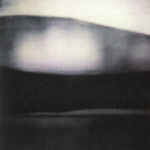 Mouthus
MouthusFor The Great Slave Lakes
[Three Lobed]
by Paul Haney
If you’re strapped for cash, those subscription services some labels offer, — in this case the Three-Lobed imprint, which this year offered an impressive line-up of folks like Sun City Girls, Wooden Wand, and others — can be a bummer. It’s all or nothing, and if one particular band catches your eye among a pack you may very well care little for, get prepared to shell out the collector bucks or hope one of your ubiquitous music nerd friends will hook you up. Thankfully, Mouthus’ subscription-only For The Great Slave Lakes saw a few copies make their way out into the open, so if you were lucky enough to grab one from a store that was excellent enough to provide such a treat, you got an entire Mouthus record that may not have previously seen the light of a shop shelf. And it’s a damn good thing that Three Lobed had some extras to spare, because it’s easily one of Mouthus’ strongest 2006 releases, possibly bettering Important’s The Long Salt, and conversely, one to live their career by. More damaged-guitar and electronically ruined drum fistfights from these Brooklyn saviors, ending with a 40-minute hypno-epic, beating that last track on Liars’ first record at its own game. So if you miss out on this one… sorry, it’s time to kick yourself.
Three Lobed
——
——
——
 Alan Sparhawk
Alan SparhawkSolo Guitar
[Silber]
by Jspicer
Alan Sparhawk is best known in his more intimate settings, whether it is the comfort of Low or coupled with his slowcore brother-in-arms Mark Kozelek. For his solo album, Sparhawk sheds comfort and stability for drone-induced storytelling. What is coaxed from a mere piece of wood, electronics, and knobs (with the help of a few pedals and processors) is the most chilling yet most reassuring piece of music all year. The title, Solo Guitar, either provokes a presence of high society or the fiddlings of a bored musician — neither fit Sparhawk’s album. Much of the record reflects on the sounds and atmosphere of weather, ships, and the sea — and nothing better than drone to echo those moments of quiet cut by an incoming freighter easing into the harbor. And it’s all capped off with a cover/tribute/interpretation of Eddie Van Halen’s masterpiece “Eruption.”
Alan Sparhawk - Silber
——
——
——
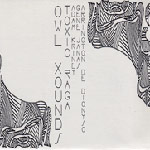 Owl Xounds
Owl XoundsToxic Raga
[Colour Sounds]
by Lars Gotrich
Andrea Centazzo had Ictus Records, Derek Bailey had Incus Records, why shouldn’t drummer Adam Kriney have Colour Sounds to release his own material and various collaborations? Owl Xounds has the biggest output and for good reason: disgusting, psychedelic freak-jazz in the spirit of ESP-Disk’s fire-music of the ’60s and ’70s. Featuring fellow New York-er Gene Janus (upright bass) and Old Time Relijun main man Arrington De Dionyso (bass clarinet, voice), this particular incarnation of the revolving Owl Xounds unit hits pockets in all the wrong places, creating harsh textures and an all-around racket. But it’s a fuckin’ good racket, one that thrusts out of the grimy spaces of the room, hits the corner table, bangs the shit out of its knee, trails blood and scabs through the doorway, but convulses with delight at the bad-ass scar it’s gonna get. Lest you think this yet another punk-jazz dick match, though, Kriney’s got the chops and sense to let the racket swirl (or, to be nasty, maybe even swill) from time to time instead of the constant quarterback blitz of most punk-jazz. Too good to stay a limited-edition release.
Owl Xounds - Colour Sounds
——
——
——
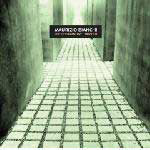 Maurizio Bianchi
Maurizio BianchiThe Testamentary Corridor
[Silentes]
By Leveer
Whether it’s my increasingly scornful tastes or just a lackluster year for fresh blood, I couldn’t think of any new groups that deserved write-ups. So instead, here’s yet another well-seasoned artist that I (criminally) hardly ever see covered anywhere. A true pioneering heavyweight in the avant-garde, Maurizio Bianchi is a visionary artist whose prolificacy dropped off in the mid-’80s, apparently to naught. Returning to music in the late ’90s, he has rediscovered his busy hand in the past couple of years, following an astounding retrospective release by fetish label Vinyl On Demand. MB’s music was initially a study in isolation and personal penitence. It is believed that he never performed live. He evolved into probing the relationships between man and machine, which brings us to this album, The Testamentary Corridor. It must be said that MB is an industrial artist, for his music reflects mechanicality and is wholly synthetic, but albums such as this fly in the face of the label’s connotations. This is music wherein Bianchi’s biology transcends the technology to a powerful effect upon the listener, joining creator and consumer in their relation to the spiritless machine. Manifold strata engulf the listener in such a way that one would be forgiven for wanting no other companions: Bianchi’s stated intent.
Maurizio Bianchi - Silentes
——
——
——
 William Elliott Whitmore
William Elliott WhitmoreSong of the Blackbird
[Southern]
by Olskooly
William Whitmore’s voice may sound like an unlikely cross between Tom Waits and Tom Jones, but with Song of the Blackbird, his third long-player, Whitmore crafted a record that was as captivating as it was compelling. The austerity of his arrangements allowed Whitmore’s gravely tales of damnation and redemption to attain a pronounced forcefulness. Rife with a rich folkloric tradition and dusty Appalachian gloom, these spare, minor-key laments served as the perfect foil for his world-weary croak, itself indicative of a wisdom beyond Whitmore’s years. Undertones of hellfire-and-brimstone didacticism a la Sixteen Horsepower resonate among these nine tracks, though unlike Whitmore’s previous two efforts a certain hopefulness was made manifest on Blackbird as well. If half of the album showcased the melancholic temperament typical of Whitmore’s debut, Hymns for the Hopeless, then the other half introduced a jaunty and playful side which found him branching out into more conventional alt-country territory. Song of the Blackbird’s narrative structure, impressive vocal harmonies, and catchy melodies are further evidence of Whitmore’s restraint and maturity, not to mention the formidable songwriting skills of one of the great talents in the genre.
William Elliott Whitmore - Southern
——
——
——
 Pedestrian Deposit
Pedestrian Deposit
Fatale
[Hospital Productions/Hanson]
by Mr P
The sound of so-called “harsh noise” has a multiplicity of meanings, and it’s perpetually fickle. Aggression, domination, fetish, sadism/masochism, unwanted sound — depending on the person, it can be represented all at once or none at all. Yet, somehow, Pedestrian Deposit (a.k.a. Jonathan Borges) funneled the energy that inspired him and channeled it without judgement on Fatale, inexplicably turning representation into pure presentation. On first listen, these inspirations seemed to suggest taking negative energy and shifting its focus into positive energy, yet believing his inspirations were in fact “negative” to begin with is being presumptuous. Judgment isn’t without its merits, but Borges seemed much more concerned with fascilitating new sonorical connections with his inspirations rather than attempting to use sound to delineate between “good” and “bad.” As such, the four tracks on Fatale drove these very inspirations, and when artists like Pedestrian Deposit take these topics head-on — without the typical musical exagerrations bloated with cultural meaning — it becomes something else entirely. Sometimes uninhibited reactions to jealousy or rejection or obsession is best understood or experienced without words, and Pedestrian Deposit showed us that judgment isn’t a necessary component.
Pedestrian Deposit - Hospital - Hanson
——
——
—— Ex-Cocaine
Ex-Cocaine
Keep America Mellow
[Killertree]
by Matt Weir
This swampy and hypnotic blues-rock duo — bongos and electric guitar — was my favorite act at No Fun Fest this year. I couldn’t move faster than slow-motion during the whole set, not even when they launched into a Grateful Dead cover. It was also their first show outside of their hometown of Missoula, Montana. Whoa. Killertree Records is in their third pressing of this LP, so impulsively order it now or forever miss out on the best porch music since a drifter with a banjo. Keep America Mellow is lo-fi in the best way possible, where the low quality disorients the listener and melds seemingly disparate sounds — voice, fuzz guitar, and bongos — into an ebb and flow of reverb and howl. Also check out their cassette Age of Time (released on Heavy Tapes), which features both of the exes on guitar. This band should get out of town more often.
Killertree - Heavy Tapes
——
——
—— CJ Boyd
CJ Boyd
The Greatest Weight
[Sounds Are Active]
by P Funk
Even my favorite bassists — Charlie Haden, Sirone, William Parker — lose me when they play extended, unaccompanied, free-form solos. On a theoretical level, I’m all for these kinds of solos, but at the end of the day, there’s a limited audience for them, and it’s one I’m not part of. The Greatest Weight is a solo acoustic bass album for the rest of us. Okay, so Boyd’s cheating a bit — he layers multiple tracks of his playing to create lush, liquid music that sounds more like the quietest moments in Talk Talk’s last two albums than the part of an Anthony Braxton concert where Mark Dresser goes it alone. But this is heavenly stuff, an organic palate cleanser for Kranky-ophiles and adorers of the deep, dubbed-out techno of Pole and Porter Ricks.
CJ Boyd - Sounds Are Active
——
——
—— Grunt
Grunt
Seer of Decay
[Freak Animal]
by Leveer
The community of experimental music is glutted with indistinguishably lifeless and flaccid, motionless and emotionless groups that leave me wanting. There are far too many that might engage the very front of my brain, but fail to elicit any response beyond that. Flat and drab, they have become the rank and file, surely elevating none above the most slanderous intent of their chosen banner: noise. Noise surely serves sociological needs and stems from creative impulses, but it can largely be a self-indulgent undertaking, spawning a society of reflective praise. If it’s not going to attempt to engage the audience, it had better fully embrace its misanthropy and malevolence. Grunt cannot be said to do anything but. And he succeeds with striking aplomb. Whereas the aforementioned variety of noise addresses only limited faculties of the listener, Grunt abuses your entire being. Familiar, concordant sounds grip your sympathies and subsequently are the underpinning to the torture of your mental and physical well-being; buffeting your ears, gut, shoulders, and brain with sounds that are again familiar, but this time they’re of the rather malicious sort. The end result is a listening experience of which the power is undeniable. It is a true challenge to give yourself to Seer of Decay for its entire tenure, and how can it be denied that this a hallmark of a true accomplishment of art? The bigger the equipment, the more boring the sound, seen exemplified in this contrapositive.
Grunt - Freak Animal
——
——
——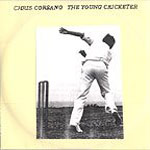 Chris Corsano
Chris Corsano
The Young Cricketer
[Hot Cars Warp]
by Jspicer
A drummer recording a solo album sounds like the worst of ideas. Forty-five minutes of drums fills and solos for the Neil Peart and John Bonham in all of us just doesn’t give me a boner like it once did. Thankfully, Chris Corsano is a drumming beast, but he’s not dumb enough to deliver an album full of drumming masturbation. Combining the musical proficiency of Glenn Kotche’s Mobile with the mind-bending experimentation and sonic revelry of his peers, Corsano created an album that’s part concept, all mind-melter. The songs are angular, sharp, and fierce — and though they are centered on Corsano’s unique drum creations, he’s able to introduce a cult fanbase to his other musical whimsies. The Young Cricketer isn’t Corsano beating on any percussive object he can conquer, but spreading his wings. Years of playing with Paul Flaherty, Ben Chasny, Thurston Moore, and Brian Sullivan have paid off with an explosive and pure solo debut.
Chris Corsano
——
——
——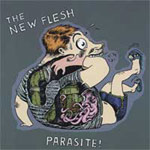 New Flesh/Puke Attack
New Flesh/Puke Attack
Love Cums 1st - Split 12”
[Self-Released]
by S. Kobak
Among the current wave of new-breed throwbacks to feedback-ridden ’80s hardcore, The New Flesh are at the top of the pile. A tasty sonic blend of disturbing screaming vocals, guitar and bass lines that sketch a sonic wasteland, musclehead drumming and tonal noise, the band manage build on a sound template created by such luminaries as Drunks With Guns and Amphetamine Reptile noise-rock groups (see Cows, early Today Is The Day and Halo Of Flies). Their side of the LP is pure damage. Bassist Jason Donnells recovers the art of the menacing line, leading into most songs with an urgent, nightmarish thunderstick threat. Dan Prophet leaks a sustained feedback before shredding discordant, sometimes shaky riffs of unadulterated rage. Both split vocal duties, shouting their disturbing elegiac truths. Rick Weaver secures the chronic pandemonium, beating his skins like an abusive stepfather. Even when the band slows to a sludge pace on tracks like “Waiting in Line” and “Knock Down Drag Out,” the lingering danger of their music bleeds through. The muddy, lo-fi production gives the vinyl a live, analog fell that comes close to capturing the raw feeling of a New Flesh gig. Puke Attack show potential, cranking through a set balls out post-hardcore with a no-wave tinge. Worth the price of admission alone for the swift hail-maker to the stomach that the New Flesh deal time and again.
New Flesh - Puke Attack
——
——
——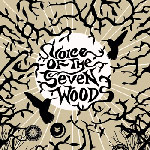 Voice of the Seven Woods
Voice of the Seven Woods
Tchantinler EP
[Self-Released]
by David Nadelle
Some things just stick in your mind. Earlier this year I found myself completely awestruck upon hearing a long, very long, acoustic workout on an online station. It took months, but I finally found out that the sublime piece was recorded (as a live improv no less!) by one Rick Tomlinson, a Twisted Nerve Records doppleganger who plies his guitar god trade as Voice Of The Seven Woods. Although I was much too late to pick up the 21-minute, 3” CDR “The Withering of the Boughs”, I jumped all over the exquisite Tchantinler EP when I got the chance. I hate to have to be obvious and drop the words “John” and “Fahey” here but besides the remarkable fingerpicking, Tomlinson shares another crucial similarity with the late master: a fear of remaining static. With a combined five tracks clocking in at just over ten minutes some might feel they are getting ripped off, but any scrooge-like thoughts are forgotten with the start of every sympathetic-stringed sitar raga or double-gorgeous guitar gambit. One senses every VOTSW release will be a significant event different from the last, with the self-taught Tomlinson paying homage to the giants of the genre like Graham, Jansch and, yes, Fahey while he continues to carve out his own niche in true maverick style.
Voice of the Seven Woods
——
——
—— Dom Minasi
Dom Minasi
The Vampire’s Revenge
[CDM]
by W.C.
Jazz guitarist Dom Minasi has had a long career with a remarkably small discography to show for it. While always riding on the fringes avant garde he finally let loose on what seemed like something he spent his whole life working toward. Unfortunately (depending on your taste in literature and homage) his swan song, The Vampire’s Revenge, claimed a large debt to the novels of author Anne Rice. Although his is dream wouldn’t have been a success if the portrayal hadn’t been anything less than accurate, growling operatic librettos intermingling with squealing horns and pizzicato fret board clinking clearly defined Minasi’s two-disc opus as an entity unto itself. Compositionally rigorous, involving organized yet improvised orchestral density, Minasi utilized a countless number of yesterday and today’s most forward thinking musicians (including Steve Swell and Joe McPhee), creating several large super groups. Their improvisation was impressive, but as a way of defining structured narrative, they succeeded in storytelling with a Brecht-like methodology. Full of dark vaudevillian tapestries by way of preplanned overtures and perplexing group freak-outs, The Vampire’s Revenge tapped into the spirit of the books but more importantly, it was the crowning achievement of Dom Minasi’s career.
Dom Minasi - CDM
——
——
—— Blut Aus Nord
Blut Aus Nord
Mort
[Candlelight]
by Olskooly
Disturbing, twisted, and even frightening at times, Blut Aus Nord’s Mort (allegedly an acronym for “Metamporphosis of Realistic Theories”) was without question one of the most innovative and patently experimental metal albums of the year. Subverting the traditional black metal template to an unprecedented degree, the French outfit proved with this release that they can hold their own against even the grimmest of the Scandinavian black metallers. But unlike Blut Aus Nord’s Nordic forebears, the band, along with like-minded North American counterparts such as Xasthur and a handful of other über-talented and brazenly intrepid Eastern European musicians, have helped elevate the black metal idiom to a literal art form. Combining elements of dark ambient, funeral doom, progressive rock, and of course black metal, Mort, put simply, sounded like no other genre piece we had yet heard. Having done away with traditional black metal’s characteristic blast beats, Mort’s slow- to mid-tempo pieces allowed the band’s atmospheric and compositional components to take center stage. Frontman Vindsval’s eerie, frequently atonal fretwork somehow blended seamlessly with the band’s moody, bleak compositions, as did his deeply anguished vocals, which suggested the most lugubrious of glimpses into the nether regions of hell.
Blut Aus Nord - Candelight
——
——
——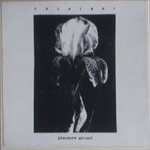 Prurient
Prurient
Pleasure Ground
[Load]
by Paul Haney
I know most people don’t think of harsh-noise records as dynamic, and while the utter lack of any semblance of subtlety is a deal-breaker for many when it comes to the most punishing noise mongers, Dominick Fernow has really outdone himself with Pleasure Ground. It’s acerbic, relentless, and skin-peelingly blaring, but at the same time, there’s more deeply buried melody and hidden gorgeousness than, well, any harsh noise release in a long fucking time. That’s not to say this is easy listening or a perfect stocking-stuffer for the ‘rents; Fernow still shouts with enough ruin to make many extreme-metal mavens seem spineless in contrast, and there’s little more to Pleasure Ground than the visceral pleasure derived from drastically distorted electronics and the filthy residue left behind. Still, for those who can’t yet find the appeal in Whitehouse or Incapacitants, this is a rather great record to challenge one’s assumptions as well as a piece of compelling noise-art to please those already soothed by the sound of grating textures.
Prurient - Load
——
——
—— Current 93
Current 93
Black Ships Ate the Sky
[Durtro]
by Lars Gotrich
It is on Black Ships Ate the Sky that David Tibet finally realizes the vision he began with Thunder Perfect Mind (1992), a gothic piece of folklore that’s achieved an underground mythology, a sound that is both harrowing and delicate. Loosely framed around eight versions of “Idumea,” a song about God’s judgment on the Edomites written by Charles Wesley in 1763, as sung by eight different vocalists (Antony, Bonnie “Prince” Billy, and Shirley Collins, to name a few), the album’s almost like a self-fulfilling prophecy. Well, at least in the narrative Tibet’s built out of his reoccurring “black ships” dreams that challenge our conceptions of the sacred and the profane. The thing is, like David Eugene Edwards, Tibet presents a God to be feared for His power to redeem, so his profanity becomes sacred. Once again, an outstanding cast of musicians joins him: newcomers Ben Chasny (Six Organs of Admittance) and drone master William Basinski as well as the usual suspects Steven Stapleton (Nurse With Wound) and Michael Cashmore. The guitar interplay between Chasny and Cashmore is particularly inspired: It drones with impending death in its strings, yet retains a redemptive melody like an Orthodox liturgy. Tibet’s half-sung/half-spoken delivery has finally found proper accompaniment.
Current 93 - Durtro
——
——
—— Mlehst
Mlehst
Notes of Obscure Origin
[Nihilist]
by Leveer
Why so often the fear to leave anything in the dynamic range of a recording, even among those with well trained ears and musical sense? The body can adapt to almost any stimulus, no matter how extreme; it’s not the velocity but rather the acceleration that affects us. When artists can be sparing and thoughtful in their work’s disposition, my interest is always piqued. Again as a direct rebuttal to the dumb-/numbness of so much experimental music, Mlehst could be said to offer a tool to hone our capacities as listeners in Notes of Obscure Origin. That would, of course, not be robustly descriptive of this album, but to my ears that would be an expansion of the praise I could heap on most things I’ve heard. Mlehst combines the strengths of the other two artists I described, the taming of technology to a fleshy end of Maurizio Bianchi, and the choice and severity of the sounds made by that technology demonstrated by Grunt. While either of those is surely a more affecting listen, this is a more intellectual rumination, a sound sculpture more dynamically reimagined.
Mlehst - Nihilist
——
——
—— Goliath Bird Eater
Goliath Bird Eater
Blood Venus
[Not Not Fun]
by Jspicer
People fawned over black-fuzz duos such as Death From Above 1979 and Mommy and Daddy for much of last year. Apparently they were never introduced to Bobb Bruno and Jeremy Villalobos. Those about to rock, please meet those who are ready to rock you. With a band name like Goliath Bird Eater, you’re going to turn the heads. With an album like Blood Venus, you’re going to blow those heads away. Necks be warned, the guitar and drum assault is in full fuzz throughout Blood Venus. It’s a blistering piece of rock so viscous and heavy that I challenge all of you to be weighed down by its awesomeness for days on end. Call it stoner drone, call it black metal, call it fucking rock ‘n’ roll. I haven’t rocked this hard since I was a wee-kid rocking air guitar solos to bands Goliath Bird Eater passed by just by being born.
Goliath Bird Eater - Not Not Fun
More about: Pedestrian Deposit

